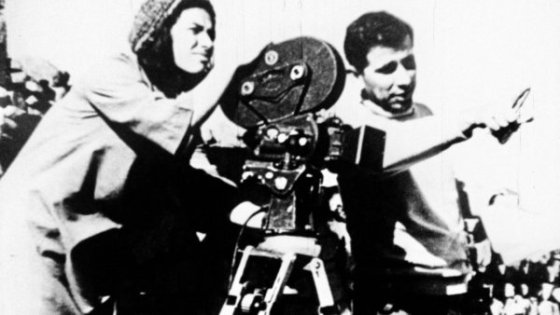Home > Festivals and Events > Road to Palestine (1985), dir: Layaly Badr and Upper Gate (1991), dir: (...)
Road to Palestine (1985), dir: Layaly Badr and Upper Gate (1991), dir: Arab Loutfi - London Palestine FF
Wednesday 18 December 2019, by
The London Palestine Film Festival’s ‘Women of the Revolution’ event featured two films from female directors – both grainy but politically vital insights into the plight of Palestinians in the 1980s.
The first, Layaly Badr’s Road to Palestine, served as a dark short with a long message – one of deep-rooted resistance and tragic injustices, a tale of Palestine’s reality for decades. The film, as a cartoon, burdens stick figures with the results of conflict and oppression, in the setting of a Palestinian refugee camp. As Badr expanded in the Q&A after the film, the drawings were actually created by European children after hearing the story of airstrikes on these camps; thus the animation is purposely childlike in its style and reaction to the horror. The danger present in the short is accentuated through dark colours, the sound of beating drums and an almost psychedelic, disjointed animation style which brings an intriguing innocence to the whole film, as it deals with such a heavy subject. A heart-breaking point was made by the director; her film was an actual articulation of a 7-year-old Palestinian refugee’s account of an airstrike on her camp, who described the bombs as ‘balloons from the sky’. Again, the grim spectre of innocence in the face of the horror of war is blatant. Ultimately, the film points toward the sad reality that work and struggle are unbreakable bonds in Palestinian existence, and hints at how kids grow up early in prison camps due to being forced to confront the reality that ‘struggle is our only way to Palestine’.

The second film featured beautiful archival footage of interviews with Palestinian refugees in Lebanon, peppered with the marks of time and, possibly, clandestine transportation. Arab Loutfi’s Upper Gate shows real people, real lives affected by the occupation of Sidon in southern Lebanon. The diverse figures interviewed have many informative stories to tell; tragic, yes, but also at times humorous, blunt or meandering. As one interviewee expands, their position as refugees in another country left them stigmatised but the pride of their homeland never wavered, it is part of their constant psychological resistance to occupation. The film fluctuates between soothing voices, blotchy images and tales of tragedy and struggle. Though the interviews are of immense historical value, the diversity of points being made and the confusion of the conflicts they discuss often leaves one lost – a guiding narrative would’ve assisted greatly, though given the restrictions of the time, budget and otherwise, it is understandable why the dialogues are just presented as ‘raw’. Still, Loutfi managed to create an introspective piece featuring tranquil footage, of the sea or people laughing together, that contrasts seamlessly to descriptions of the brutality of the war.
Both these passionate female directors deserve recognition for what they achieved at a very politically dangerous and hostile time. As Loutfi articulated in an inspiring video testimony, ‘filmmaking is an expression and defiance against erasure of Palestinian identity.’